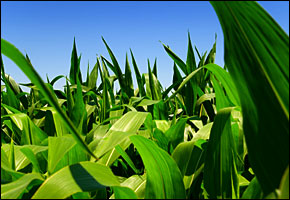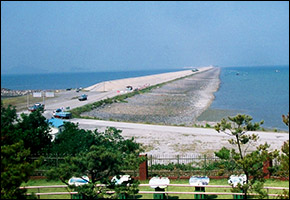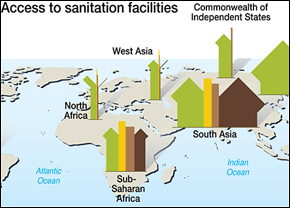Biofuels: Choice of fuel, food or water?

Nations make tradeoffs to feed ever-increasing energy needs
By C.T. Pope
Circle of Blue
With fuel prices still on the rise, President Bush held a press conference on Tuesday to call for an increase in U.S. biofuel production in order to mitigate the country’s dependence on foreign oil. “[T]he high price of gasoline is going to spur more investment in ethanol as an alternative to gasoline…it’s in our national interest that our farmers grow energy, as opposed to us purchasing energy from parts of the world that are unstable or may not like us,” Bush said.
The call came as world grain shortages continued to cause global unrest. With the U.S. Department of Agriculture estimating that as much as 20% of increased grain prices resulted from ethanol production, several prominent scientists at the CGIAR institute (Consultative Group on International Agricultural Research) have called for a temporary moratorium on biofuels.
The International Water Management Institute (IWMI), a branch of CGIAR, also reported late last year on the “blue” cost of biofuels. In its report, the Institute highlighted the ambitious goals of both China and India to increase their overall biofuel production. The IWMI report highlighted the tradeoffs these nations will have to make to achieve their objectives.
“[The] goals for biofuel production in China and India raise serious concerns because the crops to be used—maize in China and sugarcane in India—are particularly water intensive. A worsening water scarcity situation in both countries makes this prospect untenable and is likely to jeopardize sustainable water use for food production,” an IWMI press release said.
As global populations continue to rise, national needs for water, fuel, and food all seem to coalesce around biofuels.
In the U.S. alone, Dr. Jan Kreider, previously of the University of Colorado, found that the production of one gallon (3.78 liters) of ethanol consumes between 146 and 900 gallons (552-3402 liters) of water, depending on the crop being used. Grain crops, such as corn and soybeans, tend to require more water for irrigation than “cellulose”-based crops like switchgrass. The fermentation process also consumes much more water than traditional fuel refinement practices.
According to the National Research Council (NRC), water-related concerns need to become a major element of future policies driving ethanol production in the U.S.
“As biofuel production expands, and particularly as new cellulosic alternatives are developed, there is a real opportunity to shape policies to also meet objectives related to water-use and [water]-quality impacts,” the NRC reports in a recent publication entitled Water Implications of Biofuels Production in the United States.
As global fuel prices soar, many nations are turning to ethanol as an alternative. And, while the implications of biofuels related to grain prices have been thoroughly explored, a clear understanding of the tradeoffs between food, fuel and water is only now emerging.
Further Reading:
Fuel vs. Food: Debate Flares (AP)
Water Implications of Biofuels Production in the United States (NRC)
Across Globe, Empty Bellies Bring Rising Anger (New York Times)
Getting the message out: Challenging people to think differently (IWMI) – Acrobat PDF
The Biofuel Revolution: Boon or Bane for the Developing World’s Poor? (CGIAR)
Press Conference by the President, April 29, 2008
Biofuel crops could drain developing world dry (SciDev.net)
Circle of Blue’s east coast correspondent based in New York. He specializes on water conflict and the water-food-energy nexus. He previously worked as a political risk analyst covering equatorial Africa’s energy sector, and sustainable development in sub-Saharan Africa. Contact: Cody.Pope@circleofblue.org







Wanted to bring to your attention a short paper on Biofuels and global water challenges; you can see it at the url above.. Also, thanks, this website is a great initiative. Best